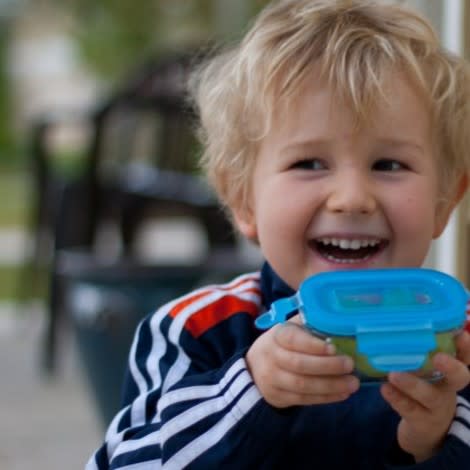6 Ways to Help Big Sibs Stay Happy with a New Baby in the House

I have to hand it to my 3-year-old, Kaspar; since his baby brother's arrival, he has been more patient than I ever imagined he would be--or could be--especially considering how frequently he was asked to wait before I'm able to turn my attention toward him. Don't get me wrong--we've certainly seen our share of meltdowns since baby Otto's arrival, but I've recently developed some strategies for preemptively keeping Kaspar's inner threenager calm, cool and collected… most of the time. This, in turn, has kept the chaos level in our home at maybe a medium-low, which is pretty good for nine weeks out, no? Read on for some small changes that have made a big difference in helping our little dude adjust to life at home with a baby in the mix.
1. Grab and Go Snacks: I took a tip from Kaspar's Montessori classroom and looked for ways to help him be more independent in our home. Empowering him to do things for himself leads to a lot less whining when my hands are full with the baby. I started by making over the bottom-most produce drawer in our fridge, stocking it with healthy snacks in single-serving containers Kaspar can open himself (but can't break). This way, he can eat whenever he wants to, and he also feels like he's choosing what he snacks on. Of course, I've made the choices for him in advance; he's chowing down on fruit, cheese, veggies and clean proteins, which--unlike sugary convenience foods--make him instantly more agreeable in all other areas of life. It's a win-win all around.
Bonus tip: I love Wean Green food containers--they're leak-proof, kid-proof (five times stronger than regular glass!), and they don't leach any nasty chemicals into my kiddo's food.
2. Step Up: I bought Kaspar a basic folding step-stool so he can reach his bathroom sink (encouraging hand-washing) and other high-up places. Folding it, carrying it and setting it up again also gives Kas something physical to focus on when I can see he's getting antsy, but when it's not a good time to run off steam outdoors. (Switching gears, or locations, is simply not as straight-forward while caring for an infant too.) This is ideal during the pre-dinner hour, for example, when I'll ask him to bring his stool to the counter to help me cook. By the time he arrives there, having hauled his stool over and set it up for action, he feels accomplished, and thus calmer, and I've had a chance to get the baby settled and myself set up too.
Related: Combating Sibling Rivalry: Tips for Peace and Affection
3. Solo Fun Within Sight: Every now and then, I leave a new coloring book on Kaspar's craft table for him to discover when he walks by. I've also put his one-player toys and games (he loves his wooden train tracks, and my mom recently gave us this great game) in his direct sightlines. I've, meanwhile, moved his two-player activities higher up on the shelf. This makes independent play more automatic for him--he's less likely to become frustrated when I can't immediately play a game with him. And it makes the two-player games feel all the more exciting and special when we do pull them down from the shelf.
4. Undivided Attention (even in small doses): On that note, I try to give Kaspar my absolute undivided attention (no texting, emailing or cleaning up), even for five or 10 minutes at a time, at least once every hour. Otto might be hanging out in his bouncer, or even in a carrier on me, but I make a point to make this dedicated Kaspar time. Dr. Harvey Karp refers to these regular doses of one-on-one interaction as "feeding the meter." It's pretty amazing how much that investment pays off with young children. Kaspar is far more flexible about sharing me when he has had all of me for even a little while.
5. Run, kiddo, run! After I pick Kaspar up from school each day, I try to either take him to a park or just for a walk around our neighborhood, so he can run around in the fresh air and burn off some of his energy. The combination of exercise and natural surroundings is the perfect antidote to the cabin fever that can otherwise set in at home.
6. Keep It Positive: We have two jars on our kitchen table. One is full of colorful stones I bought at a craft store. The other is empty. During the day, when we need his cooperation, we'll say, for example, "Kaspar, we need to get our shoes on now. This is an opportunity to earn a stone!" When he cooperates, he gets to transfer a stone from the full jar to the empty one. At the end of the day, we count the stones he's earned, and we read that number of books at bedtime.
We never remove stones from the jar once he's earned them; we tried that a few times when he was particularly uncooperative, and it totally backfired. (Meltdown city/acting up all day.) Instead, the positive incentive system yields better results. Are we bribing him? Maybe. But hey, it's working for us; not only is Kaspar responsive when he can potentially earn a stone, but it helps keep our time together more positive overall. Given that Kas has just experienced a huge change in his life at home, and that he's being such a good sport about it, this positive focus feels really important. (And it's way more fun for me than nagging him.)
-By Taylor Hengen Newman
For 9 ways to prepare your child for a sibling, visit BabyZone!
MORE ON BABYZONE
10 gifts for siblings that encourage involvement
Is it wise to combine sibling birthday parties?
7 ways for siblings to get involved in the pregnancy

